|
Day 3 - July 30
We woke up early, full of
anticipation. Today
we were heading to the Willmore Wilderness Park.
Just north of the Jasper National Park, this 4,600 square
kilometer wilderness area has no roads and allows no motorized
vehicles; the only access to the park is on horseback or by
backpacking. We
had booked a four-day riding/packhorse/camping trip, and the
outfitter had promised to take us to areas that few people ever
see.
The night before, we had dragged
everything we had brought on the trip (which was about twice as
much as we should have) into our motel room for repacking.
Coming out in the morning, we had more bags than we checked
in with; the people at the Twin Pines must have thought us
strange. Figuring we'd
better have a meal while we could, we stopped for breakfast at
McDonalds; we didn't know what the food would be like on the
trail, but we had visions of cold canned beans and burnt hotdogs.
Fortunately we had packed plenty of granola bars in case we
needed some sustenance to tide us over.
We had booked the trip with
a guy named Tyler. Actually,
he was our second outfitter; originally we had made arrangements
with another guide, but about a week before leaving for Canada we
found out that he had skipped town after cleaning out the bank
account, taking our deposit along with him.
So after a few frantic phone calls and some word of mouth
recommendations, we found Tyler, who had made last minute
arrangements for us to ride and camp with his father Pete's
outfit.
We phoned Tyler to find out where
to meet him - but rather than giving us directions, he told us to
come to the town of Grand Cache and then phone him again.
Aside from the International Roaming charges being accrued
by my cell phone, this made us a little nervous; he'd better
answer when we called back! Suppressing
mental images of wandering around Canada unable to reach the
elusive Tyler, we left Hinton and headed for Grand Cache, 152
kilometers to the north.
We left the mountains behind,
driving through a forestry area, where mile after mile of rolling
hills were planted in pine trees. But as we neared Grand Cache we
could see mountains to our left again, and as we climbed up onto
the plateau where the town was sited, the scenery was once again
impressive. Grand
Cache is a small town, but apparently its usual population was
doubled that weekend, as long distance runners flocked to the area
for the 'Grand Cache Death Race,' a 70 mile foot race through the
mountains.
We stopped at a gas station
for fuel and phoned Tyler again; he said he would meet us in 10
minutes. He asked us
if we had bathing suits for the hot tub in camp; ha-ha, very
funny, a little cowboy humor, we supposed.
But true to his
word, he showed up shortly, horse trailer in tow, and told us to
follow him.
We turned down a gravel road and
passed a sign for the Sulpher Gates Provisional Recreation Area.
Following the horse trailer in a cloud of dust for several
miles, we mused that the name Sulpher Gates sounded somewhat
hellish, but Tyler did not appear to be the devil, and eventually
he led us to a small parking lot, with a corral filled with
horses, mules and wranglers.
Tyler introduced us to our horses;
mine was a palomino mare named Magic.
She was sturdily built, mostly Quarter Horse with a touch
of Percheron. Tyler
said she was gentle enough to take his 4 year old daughter riding
on. Jineen's horse was
a chunky grey called Blue. We
left our duffel bags with the wranglers to be brought into camp on
the pack horses, and stowed our cameras, water bottle and rain
gear in our saddlebags. Before
we knew it we were mounted up and heading out on the trail with a
young wrangler named Rob. He
was riding an attractive bay Morgan /Percheron cross, and carried
a rifle in a scabbard on his saddle, presumably in case of bears.
We
headed off through the woods, climbing steadily.
To our left we could catch glimpses through the trees of a
wide greenish-gray river far below us.
We followed a wide path up and down steep hillsides,
roughly parallel to the river.
The trunks of the aspen trees glowed white in the sunlight.
After a while, we came out into an
open meadow where we could see rolling hills sloping up to tall
mountains on our right. Rob
pointed out an elk in the glade; it moved quickly away, much more
wary than those in Jasper. We
stopped on a ledge above the river and looked across to the
mountains on the other side. It
was a beautiful warm day, with blue sky and puffy white clouds.
|
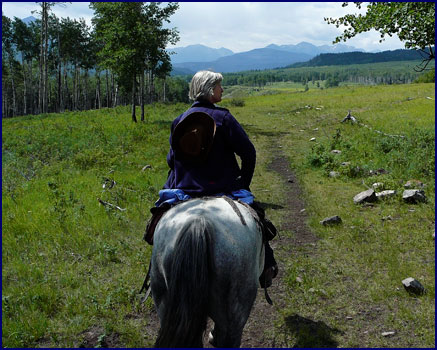
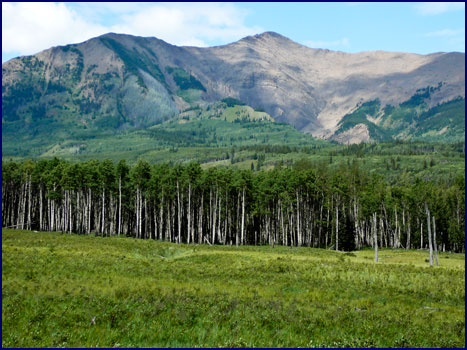
Riding through Willmore
|
Magic was a pleasant ride; she was very steady and quiet,
but forward thinking and eager to keep up.
Jineen found Blue's gaits less than comfortable.
The western saddles were very different from what we are
used to, but actually quite comfortable.
At
first Rob did not seem overjoyed to have drawn the job of taking
us to camp - I am sure leading trail riders, many of whom have no
experience with horses, is not a wrangler's favorite task. He
kept the pace to a walk for quite a while before checking out our
equestrian skills with a bit of trot.
When that didn't faze us, he reined in, gave us a devilish
grin, then turned and slapped his horse on the shoulder with the
end of his reins and took off at a quick gallop.
I think he was testing us - these east coast Yanks say they
ride, let's see if they can really
ride. Looking back to
find us keeping pace with him and grinning, he seemed satisfied.
After that, having apparently passed the horsemanship test,
our walking was occasionally punctuated with sharp gallops, and
Rob was much more friendly and talkative. He
did indicate that galloping with the clients was not usual
procedure.
After about two hours, we crossed
a rocky stream and arrived at the camp. A
loose collection of tents, log buildings and corrals were set in a
clearing amidst a poplar forest, beside the swift flowing brook.
I immediately thought the camp had a friendly feel, and
this was quickly confirmed upon meeting Lois, who was Tyler's
mother and the camp cook. An
immediately likable person, she gave us cold ice tea and a plate
of the best chocolate chip cookies I have ever tasted, still warm,
just out of the wood burning oven.
|
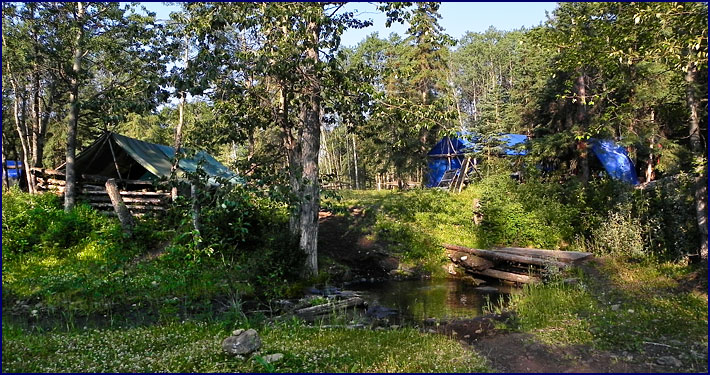
The Camp
|
After
a brief stop, we rode back out with Rob to find the 'day riders,'
the other trail riders from the camp. Magic
and Blue were less than thrilled to go back to work.
Rob took us in the direction he thought the other riders
would be, navigating through a complex network of trails.
Glad to have a guide familiar with the area, we commented
to Rob that he must know every trail out here like the back of his
hand. But no - he
informed us that he had only just joined the outfit a few days
earlier, and had never ridden out in this direction before!
But despite this we soon met up with Pete McMahon, Tyler's
dad and the owner of Sherwood Guides & Outfitters.
Pete's outfit mainly takes hunters out in the fall to hunt
bighorn sheep, but also does a few trail riders in August.
He was riding with Louise and Shelly, the only other
clients currently at the camp; they had never ridden before, but
were very game to give it a try.
The group was heading back to
camp, but Pete asked one of his experienced wranglers, Paul, to
ride on with us for a while. Jineen's
horse Blue made an unsuccessful attempt to return to camp with the
others. We followed
Paul back through the woods. Before
long we forded a small river, belly deep; the horses struggled for
their footing against the swift current.
|
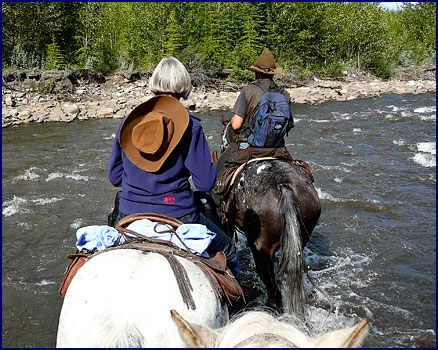
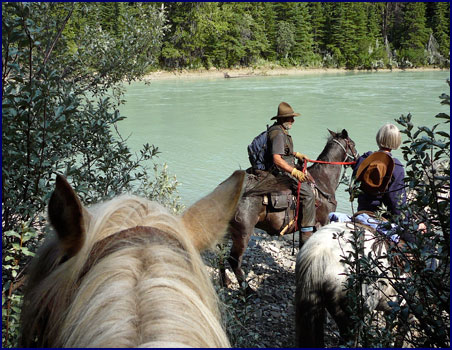
Crossing
the river with Paul
|
Paul
fit one's mental image of the old cowboy, sitting tall and easy in
the saddle. Talking
with him, we learned he is from Switzerland, and that he works as
a horse wrangler around the world.
He goes to the Yukon every summer, and then comes to Pete's
outfit in Willmore for the autumn.
When the hunting season is over he goes to Australia for a
few months (while it is summer there), then back home to
Switzerland in the spring. He
has been with Pete and Lois's outfit for quite a few years.
He has a soft-spoken and gentle way with the horses, and it
was evident that he is a gifted horseman.
Jineen and I immediately took a liking to him.
Paul
led us through the trails at a walk for a short while, then gave
us a short gentle jog. Seeing
that we appeared competent, he gave us a mischievous look,
muttered "Look out," and then took off suddenly at a
fast gallop. Magic and
Blue kept pace with him, and we seemed to have once again passed
the test.
We came out to a bluff high above
the Smoky River, where we dismounted and walked around, stretching
our legs and taking photos. The
water below was a chalky greenish gray, and the current looked
very swift. Remounting,
we followed a half-blazed trail that skirted right along the edge
of the cliff, often at a severe sideways slant.
In places the trail was only eight inches wide, which was a
bit of a problem, since Magic's width was more like a meter.
My heart was in my mouth repeatedly, but our sure-footed
mounts traversed the ridge like mountain goats.
Once we stopped in a very precarious position while Paul
dismounted to saw a small pine tree that had fallen across the
trail.
Magic was very willing and
compliant, and nothing seemed to faze her.
Paul told me that she is chainsaw broke; he taught her to
stand while he starts up the saw and cuts trees above her head
while mounted. Everyone
seemed to like Magic; many of the wranglers at the camp commented
how nice she is to ride. She
is a truly versatile horse: Tyler lets his little daughter ride
her, and Paul chainsaws from her back.
She will tolerate riders who have never been on a horse
before, carry a pack, and tie up to a tree - yet she is forward
and keen with plenty of spark.
|
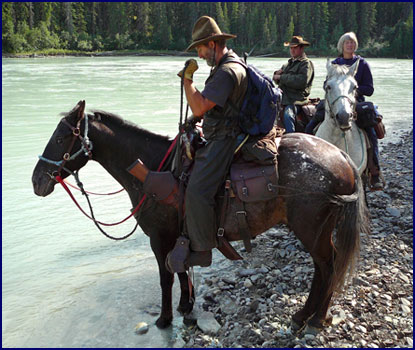
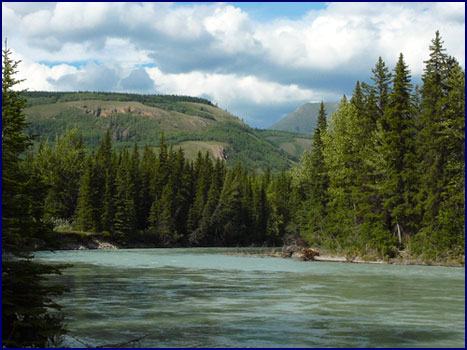
The
Smokey River
|
We
finally came away from the cliff edge, to my great relief, and
followed a small path down to an old trappers cabin by the water.
We let the horses drink from the river, and then headed for
camp.
We got back to camp at 6:00
o'clock, having ridden for about four hours.
Not an excessive amount of time in the saddle, but they
were saddles we were not accustomed to, and our leg muscles were
protesting. I realized
that in the western saddle I needed to ride with longer stirrups
to take some of the strain off my knees - I would remedy this the
next day.
Arriving in camp, we found the
corral full of horses, and quite a few saddles rested on the racks
near the hitching posts. The
other wranglers had arrived, and they helped us untack.
After currying the horses off, the wranglers would give
them a handful of oats, put a bell on a heavy leather strap around
each one's neck, and then turn them loose in the wilderness for
the night to forage for themselves.
They told us the horses often range for miles at night, but
they usually aren't too far away from the corral in the morning.
The horses rolled in the sand near the corral, and then
wandered off up the mountainside.
Our
duffels were waiting for us, having been brought into camp by pack
horse. We took our
gear to our tent, and then explored a bit.
Everything in the camp had been either built from logs cut
in the forest, or packed in on the horses and mules.
We learned that they had just opened the camp for the
season a week before our arrival, and were still in the process of
packing in equipment and setting up, preparing for the autumn
hunting season.
|
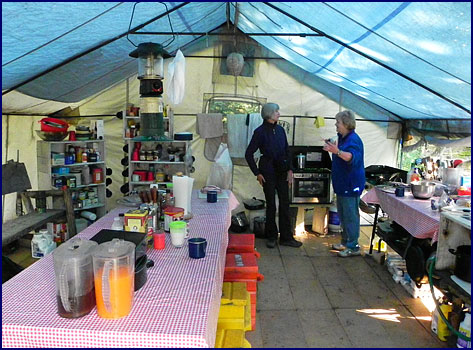
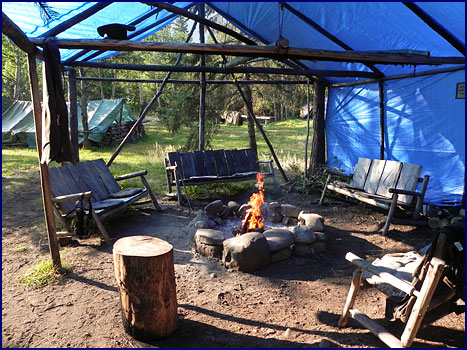
Kitchen and Campfire
|
Central
to the camp was the kitchen tent, with floor, table, benches and
counter all made from sturdy boards, cut from trees near the camp.
There were several wood stoves as well as a gas stove, and
a sink with running water, piped in by a hose from the stream.
The long table would seat at least a dozen, and in lieu of
chairs were the plastic tack boxes used on the pack horses, spaced
around the table, to be straddled at mealtime.
A campfire outside the kitchen was sheltered by a tarp
lean-to, with roughhewn log benches and chairs around it - this
was the evening gathering place.
|
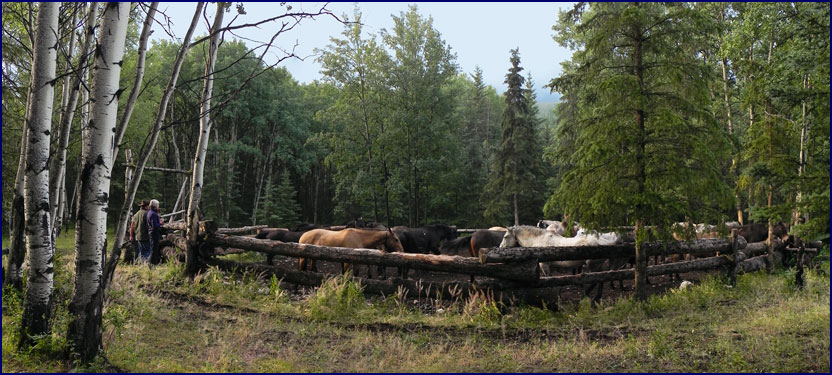
The Corral
|
There was a semi-circle of hitching posts where the horses
were tacked up; the rows of western saddles were covered by
oilskin tarps at night. A
split log corral was nearby, where the horses stood during the day
if they weren't working. A
shady spot was designated for shoeing the horses, with anvil and
farrier tools by a hitching post, and stock horseshoes stored
hanging from the branches of a pine tree. There
was a log storage building with a tarp roof for hay and equipment,
and a well stocked tool shed.
All of the food for people and the hay and grain for the
horses had been packed into camp.
The sleeping tents were supported
by log frames, each with a wooden floor, army cots, and a wood
stove. There was a log
outhouse with open slatted sides nearby; this turned out to be one
of the least endearing features of the camp, a spray bottle of
Fabreeze being the only thing that made the smell tolerable.
|
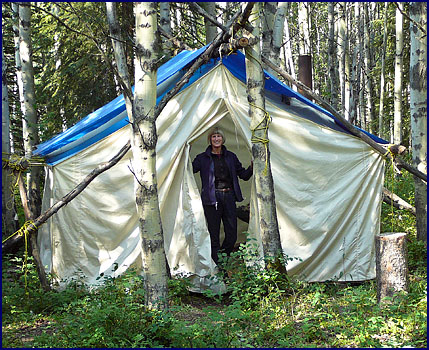
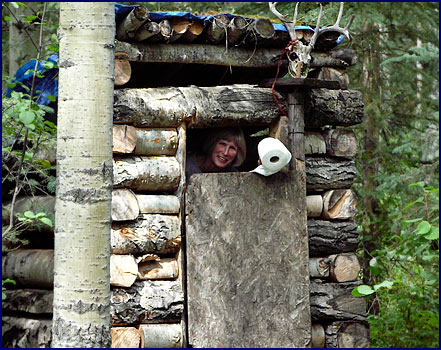
Home Sweet Home
|
The
ingenuity that had gone into the building of the camp was
impressive. A section
of the stream had been diverted for kitchen use; a gravity flow
hose brought running water to the kitchen tent, and a wide pool
served as the camp refrigerator, with the drinks and other
perishables floating in the cold water.
We were gratified to see that our bottles of wine, which
had been placed in the grain and packed in on the mules, were
bobbing in the refrigerator, chilled and ready for happy hour.
There was a spacious
shower tent with a stone floor.
Water was piped from upstream by a gravity flow system,
heated in a woodstove, and delivered delightfully hot to the
shower head. And yes,
incredibly, Tyler hadn't been kidding after all; there really WAS
a hot tub! Built out
of logs, lined with plastic sheeting, the water was heated to a
glorious 104 degrees in the shower wood stove, and circulated by a
pump powered by a solar panel.
I asked Pete how many the hot tub would hold; he replied
that it depended on how friendly they were, but at least eight.
He told us that he built it because a friend had bet him
that he couldn't.
|
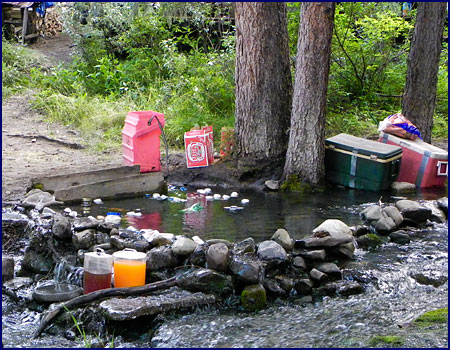
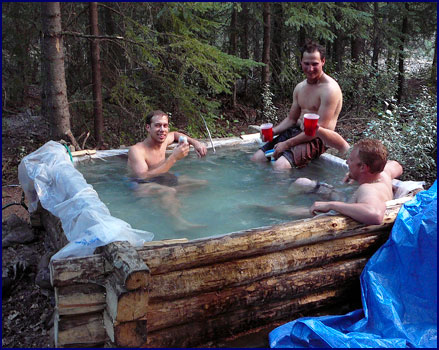
Refrigerator
and Hot Tub.
|
At
the end of each hunting season, the camp is totally taken apart.
The log frames and furniture are left, the heavy stoves are
hidden, and pretty much everything else is packed out on the
horses and mules.
Other than the guests, there were
about a dozen people in camp.
Pete was presumably in charge, but Lois, as cook, was
arguably the most important person there. Paul was the head
wrangler and in charge of the horses, and Rob, who had led us in
to camp, did the shoeing. A
half dozen others worked as wranglers, log cutters, builders,
guides, or whatever else needed doing around camp.
Some of them seemed to be employed by Pete, and others were
friends there for a working visit, or students who had come to
learn about wrangling and the wilderness.
It was a friendly group, and there was an easy sense of
companionship among them. One
of our favorite occupants of the camp was Sparky, a beautiful
collie dog who belonged to Mark, a young wrangler that worked for
Pete.
|
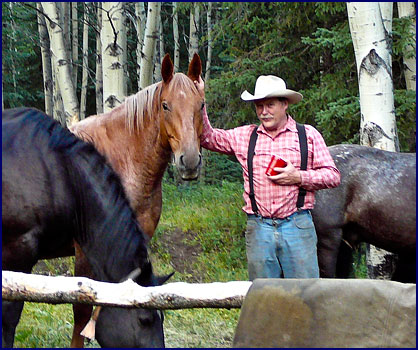
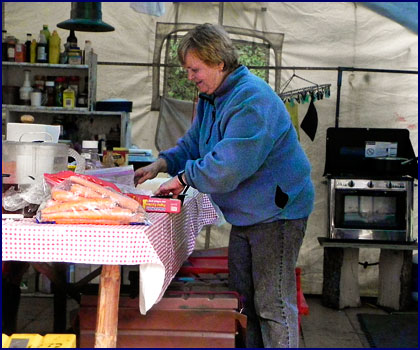
Pete and Lois
|
Lois treated us to an excellent dinner of homemade mashed
potatoes and gravy, roast beef, salad, and fresh baked bread, and
we polished off a bottle of the Stoneleigh along with it.
So much for having brought granola bars in case the food
was bad! We ended up
giving those to the horses.
After dinner everyone sat around
the campfire and talked; we learned a lot about life in the camp. Pete
said we would be going into the high country tomorrow. We
told him we wanted to see bears.
The sound of bells let us know the
horses had come back into camp for an after-dinner visit; they
browsed around a while before heading back out to the bush.
It was almost eleven o'clock when we went to our tents, and
being so far north, it was not yet fully dark.
We were armed with an insect
coil that Pete had given us to burn, telling us it would kill all
the mosquitoes in the tent; it gave off an acrid odor when we lit
it. We weren't sure it
might not kill us too, but we figured it would probably kill the
mosquitoes faster. Sure
enough, after half an hour the tent was insect free and we were
still alive, so it seemed to be working. We rolled up in our
sleeping bags and went to sleep, wondering what chances the
morning would bring.
|